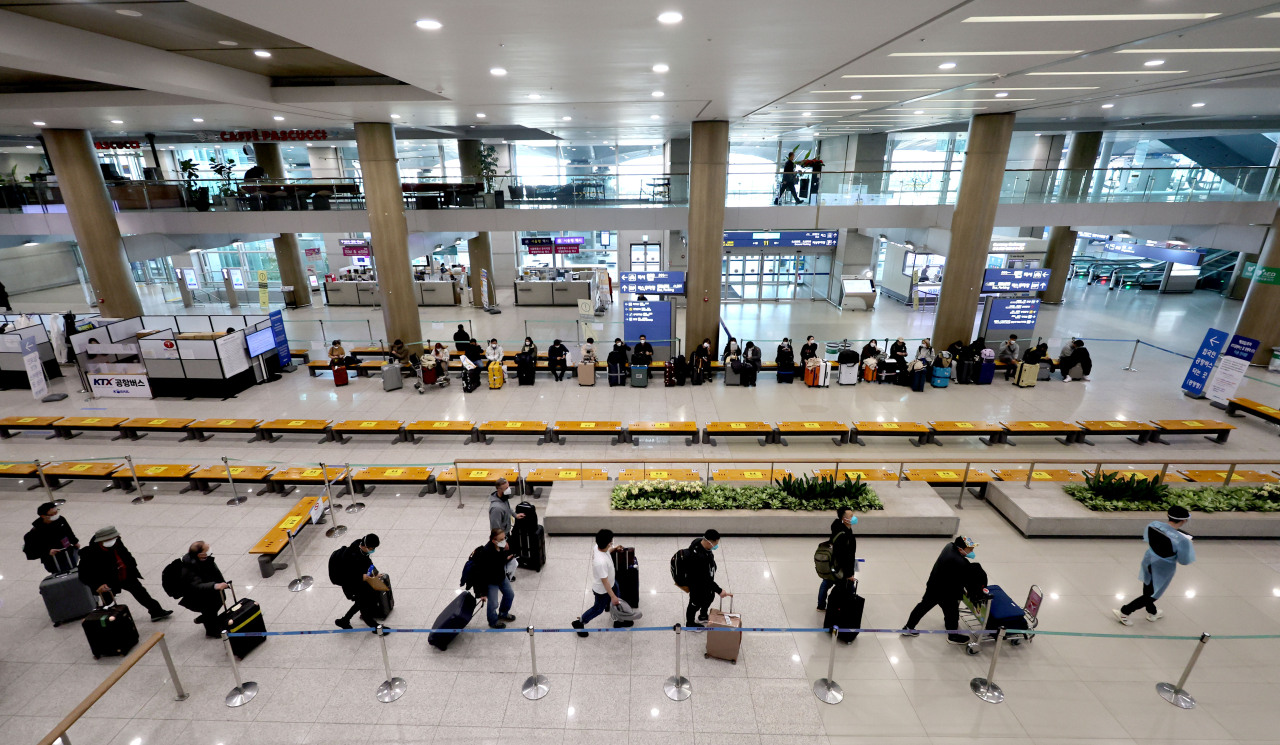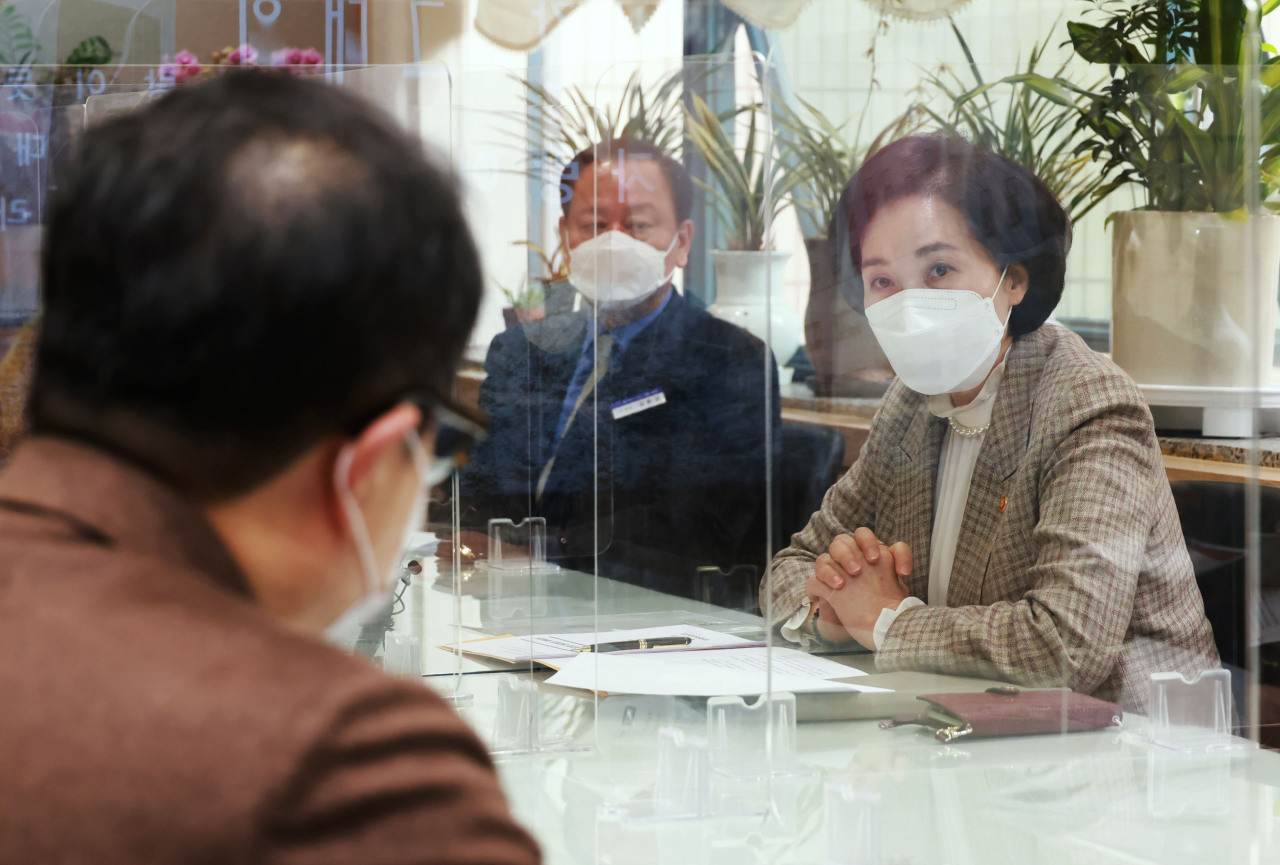Two years into pandemic, international programs continue despite obstacles for students
Number of international students down from pre-pandemic levels but optimism grows for more face-to-face learning in spring semester
By Yim Hyun-suPublished : Feb. 14, 2022 - 16:23

For nearly two years, international programs at universities and schools had to adapt to change as mandatory quarantine and remote learning were brought in. But recent data shows there has been little change in demand despite the COVID measures.
A total of 152,281 students came to South Korea to study last year, according to data from the Korean Educational Development Institute.
The figure is slightly down from 2020 when it stood at 153,695 and has fallen for two years in a row since 2019 when the country received 160,165 international students -- the highest since 2005.
While demand for language courses nearly halved compared to two years ago, more pursued a degree here than ever last year, including a bachelor’s degree, a Master’s degree and a Ph.D.
A representative at Sogang University in Seoul said things have pretty much recovered to pre-pandemic levels.
“Demand dropped after the pandemic began but it began to rebound around this winter and is expected to continue to grow this spring,” the official told The Korea Herald.
Another official at Yonsei University said: “As things went online, the numbers did not drop much. For the last year, it was switched to remote learning. For the upcoming semester, we will have face-to-face as well as hybrid classes.”
Though remote learning helped universities go ahead with classes, it has also faced backlash from students who do not feel they are getting their money’s worth, prompting a series of student protests calling on universities to return part of the tuition fees they paid.
Curfews on business hours also mean that the international student experience would be limited outside the campus.
Education Minister Yoo Eun-hae visited Sogang University on Monday to monitor the remote learning facilities, dormitories for international students and quarantine facilities for omicron patients
On Friday, the minister urged universities to take “thorough preventative measures” ahead of the beginning of the new semester in March as the omicron variant continues to spread fast in the country.
A total of 152,281 students came to South Korea to study last year, according to data from the Korean Educational Development Institute.
The figure is slightly down from 2020 when it stood at 153,695 and has fallen for two years in a row since 2019 when the country received 160,165 international students -- the highest since 2005.
While demand for language courses nearly halved compared to two years ago, more pursued a degree here than ever last year, including a bachelor’s degree, a Master’s degree and a Ph.D.
A representative at Sogang University in Seoul said things have pretty much recovered to pre-pandemic levels.
“Demand dropped after the pandemic began but it began to rebound around this winter and is expected to continue to grow this spring,” the official told The Korea Herald.
Another official at Yonsei University said: “As things went online, the numbers did not drop much. For the last year, it was switched to remote learning. For the upcoming semester, we will have face-to-face as well as hybrid classes.”
Though remote learning helped universities go ahead with classes, it has also faced backlash from students who do not feel they are getting their money’s worth, prompting a series of student protests calling on universities to return part of the tuition fees they paid.
Curfews on business hours also mean that the international student experience would be limited outside the campus.
Education Minister Yoo Eun-hae visited Sogang University on Monday to monitor the remote learning facilities, dormitories for international students and quarantine facilities for omicron patients
On Friday, the minister urged universities to take “thorough preventative measures” ahead of the beginning of the new semester in March as the omicron variant continues to spread fast in the country.

From earlier this month, mandatory quarantine for those entering South Korea was cut from 10 days to seven.
Though there are countries in Asia that have less strict travel restrictions such as Thailand, South Korea has kept its doors open to students barring a select few countries temporarily throughout the pandemic. The move to keep its border open might have given it an edge over neighboring country Japan among some prospective students and workers.
Japan has maintained a de facto ban on foreign travelers over omicron. The decision has faced backlash from many foreigners stranded abroad.
“My plan was to move to Japan and start working while finishing my Master’s degree. But after nearly 2 years of waiting I decided it is time to move on and try something new,” said Anna, a 29-year-old from Germany, who opted to come to South Korea on a working holiday permit in the end.
“I first thought about going to Korea in September, but never thought I would have to go through with my plan B of switching countries. I can say I am happy with my choice. Deciding to not go to Japan has been good for my mental health and has opened up more opportunities for me.”
English Program in Korea, widely known as EPIK – a program run by the division of the education ministry that hires English teachers for public schools -- also saw the number of teachers bounce back in 2021 from 839 in the previous year to 1,042.
Neil Young, a 37-year-old from Britain, has decided to return to teaching in Korea despite restrictions and quarantine but challenges still remain.
“I‘m quite sure I will be scratching at the walls by the end of it but I have given myself a schedule to follow, which should keep me busy. But none of my family or friends would come to visit me, because who wants to spend 7 days of your vacation in a hotel room.
“The 9 o’clock curfew is of course going to affect my experience. I‘ve actually lived in Korea before and it was more alive at night than other countries I’ve been to, so experiencing it now will be odd,” he said.
Though there are countries in Asia that have less strict travel restrictions such as Thailand, South Korea has kept its doors open to students barring a select few countries temporarily throughout the pandemic. The move to keep its border open might have given it an edge over neighboring country Japan among some prospective students and workers.
Japan has maintained a de facto ban on foreign travelers over omicron. The decision has faced backlash from many foreigners stranded abroad.
“My plan was to move to Japan and start working while finishing my Master’s degree. But after nearly 2 years of waiting I decided it is time to move on and try something new,” said Anna, a 29-year-old from Germany, who opted to come to South Korea on a working holiday permit in the end.
“I first thought about going to Korea in September, but never thought I would have to go through with my plan B of switching countries. I can say I am happy with my choice. Deciding to not go to Japan has been good for my mental health and has opened up more opportunities for me.”
English Program in Korea, widely known as EPIK – a program run by the division of the education ministry that hires English teachers for public schools -- also saw the number of teachers bounce back in 2021 from 839 in the previous year to 1,042.
Neil Young, a 37-year-old from Britain, has decided to return to teaching in Korea despite restrictions and quarantine but challenges still remain.
“I‘m quite sure I will be scratching at the walls by the end of it but I have given myself a schedule to follow, which should keep me busy. But none of my family or friends would come to visit me, because who wants to spend 7 days of your vacation in a hotel room.
“The 9 o’clock curfew is of course going to affect my experience. I‘ve actually lived in Korea before and it was more alive at night than other countries I’ve been to, so experiencing it now will be odd,” he said.


















![[Today’s K-pop] Treasure to publish magazine for debut anniversary](http://res.heraldm.com/phpwas/restmb_idxmake.php?idx=642&simg=/content/image/2024/07/26/20240726050551_0.jpg&u=)